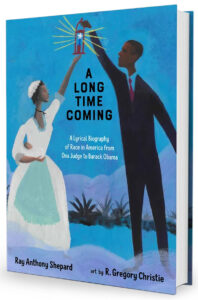 In A Long Time Coming: A Lyrical Biography of Race in America from Ona Judge to Barack Obama, award-winning author and First Parish in Lincoln member Ray Anthony Shepard explores Black Americans’ fierce struggles for freedom and justice over 200 years. He does so through biographies of six individuals, four born into slavery and two born after emancipation, revealing how the arc of reform, as the torch lighting the way to Black liberty, is metaphorically passed from generation to generation — an act visually captured by R. Gregory Christie’s cover illustration as Ona Judge extends her arm upward with the lantern for Barack Obama to receive.
In A Long Time Coming: A Lyrical Biography of Race in America from Ona Judge to Barack Obama, award-winning author and First Parish in Lincoln member Ray Anthony Shepard explores Black Americans’ fierce struggles for freedom and justice over 200 years. He does so through biographies of six individuals, four born into slavery and two born after emancipation, revealing how the arc of reform, as the torch lighting the way to Black liberty, is metaphorically passed from generation to generation — an act visually captured by R. Gregory Christie’s cover illustration as Ona Judge extends her arm upward with the lantern for Barack Obama to receive.
What is special about this book? Almost everything, starting with history and biography in free verse, written in snappy short poems with sharp imagery that pulls the reader into the thoughts, emotions, hopes, predicaments, setbacks, accomplishments, and dangers faced by the protagonist. Shepard presents the lives of Ona Judge, Frederick Douglass, Harriet Tubman, Ida B. Wells, Martin Luther King, and Barack Obama in a free-verse format with poems ranging from perhaps a dozen lines to a page and a half. While each individual is set in a historical context, the stories are told in unconventional ways. Add in titles that are bold and gripping, black and white sketches that capture the drama, as well as personal reflections periodically from the author, and we have an uncommon book indeed!
Shepard has vividly titled his poems. “Heckled,” “Sea Mob,” “Ransome,” and “Bloodhounds” make it very clear what Frederick Douglass was up against. “Coal Dust” captures the opening scene in which Ida B. Wells is wrestled by the conductor and his henchmen from the ladies’ car into the smokey one behind the engine, and “How to Ride a Bus” (followed shortly thereafter by “Gore,” “Boycott” and “Black Dimes”) captures in both sharp imagery and verse the turmoil and horror of the 1950s and ’60s civil rights struggles led by Martin Luther King.
Along with Shepard we explore questions that might have been found in their minds, hearts, and souls, such as: How did Ona Judge feel when she was presented to Martha Washington’s granddaughter as a wedding gift? How did Ida B. Wells muster the courage to expose the lynchings and massacres of the Jim Crow period? How did Barack Obama navigate being Black without rejecting his White family?
In addition to the insights on and from these “resilient lives,” we have gems of experience, insight, and perspective from Ray Shepard scattered throughout the book. He was born in Missouri and brought up and educated initially in Nebraska. His maternal grandfather was enslaved. Shepard offers glimpses of his own thoughts along the way. The book opens with his poem, “Did You Ever Wonder?” — a question just perfect for engaging readers in thinking about race in all our lives:
“Did you ever wonder
why there were the unfreed
In the land of the free?…
Shepard’s epilogue is a seven-line verse about each of his reformers ending with “It was a long time coming.” He then turns to address us, the readers, urging us to take up the mantles of these brave figures and continue their work fighting for freedom and justice for all, which has been “a long time coming.”
What an informative review of an appealing book. I can’t wait to read it.